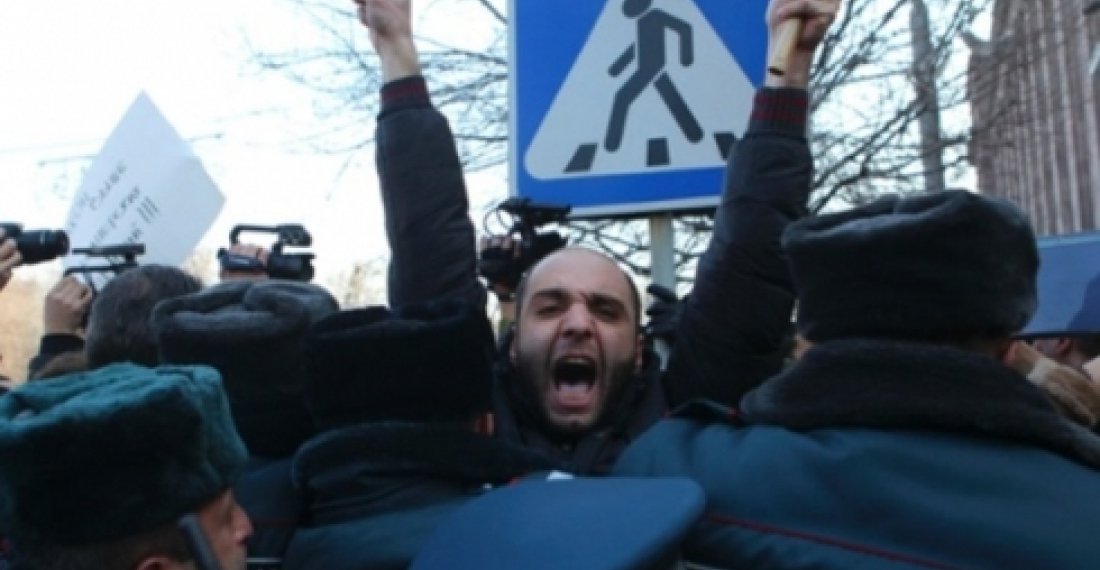The situation in Armenia's second city, Gyumri, remains tense as residents continue to express their anger over the future of a Russian soldier accused of shooting dead six members of a local family, demanding that he be handed over to Armenian law enforcement agencies. On Thursday the protests spread to Armenia's capital Yerevan. In both cities heavily armed riot policy prevented demonstrators from approaching Russian diplomatic missions and a number of people were arrested. The suspect, Valery Permyakov has been held since his capture on Tuesday morning. He had been serving as a conscript in the Russian base, which is the focal point of Russian military presence in Armenia.
Joseph Alexander Smith filed this report from Tbilisi for commonspace.eu:
Permyakov has already begun to testify about the deadly attack on six members of the Avetisyan family on Monday, which also left a six-month old baby severely wounded. Having fled from the scene, Permyakov was eventually detained in the early hours of Tuesday morning by Armenian border guards in the vicinity of the Armenian-Turkish border. After capture, he was immediately returned to the 102nd military base where he remains in custody.
Local protesters eventually dispersed on Wednesday night, but gave Russian and Armenian authorities until Thursday night to hand Permyakov over to Armenian jurisdiction or face further protests. Protesters were apparently angered by an announcement made on Tuesday by the Office of the Prosecutor-General which said that Armenian authorities were not discussion the formal extradition of Permyakov to the Republic of Armenia since the Russian constitution does not allow for the extradition of its citizens.
However, according to a 1997 treaty which regulates Russia's military presence in Armenia, Russian military personnel suspected of committing crimes off-base are to be investigated and tried by local law-enforcement agencies and judicial authorities.
Protestors are concerned both that Permyakov's case may be downplayed by Russian military authorities and that his handover to Russian military jurisdiction represents a violation of national sovereignty. During the protest on Wednesday, demonstrators shouted slogans such as "Shame on you!" and "We are the masters of our own country!"
The case has also sparked protests in the capital Yerevan, where demonstrators gathered in Liberty Square and marched to the President's palace. They called on the authorities to institute a national day of mourning for the murdered family and repeated demands for Permyakov to be handed over to Armenia's law enforcement agencies.
Fresh protests are expected in Gyumri on Thursday, when the funerals of Seryozha Avetisian, his wife, daughter, son and daughter-in-law and 2 year old granddaughter will take place. Protest leader Levon Barseghian told Radio Liberty's Armenian Service, Azatutyn.am, that after attending the service, demonstrators will march to the local prosecutor's office to hear the authorities' response to their demands.
"Locals have been quite frustrated" journalist Artur Papyan from Gyumri told Commonspace.eu. "This is the second time such a thing has happened - there was a similar case in 1999 - and many are questioning the value of having a Russian military base stationed in the city."
"The local reaction is already quite critical, but the ... criticism is mainly directed towards the Armenian authorities, not the Russians, for allowing the Russians to have their way" Papyan added.
It's unclear what ramifications the Permyakov case could have for relations between Russia and Armenia, and whether this will lead to a reassessment of Russia's military presence in the country. "Local residents have always had a very positive attitude towards the Russians and even after two Russian soldiers went on a killing spree in downtown Gyumri in 1999, the attitude didn't change" says Papyan.
"Sure, there will be protests, lots of angry words, perhaps the city authorities will put forth certain demands about increased security around the military base, but I don't think much will change in terms of the attitude of the people."
However, with frustrations brewing over Armenia's economic situation - severely affected by the drop in the value in the Russian ruble - the Permyakov case could further stoke anti-government anger in Gyumri and Armenia as a whole.
Last year, Armenia's central government refused a request from Gyumri's cash-strapped municipal council to fund badly-needed road repairs in the city. The government's response sparked allegations of retribution against local resident for voting against incumbent Serzh Sarkisyan in presidential elections in February 2013. Much of Gyumri's infrastructure is still suffering from the effects of a severe earthquake in 1988.
source: commonspace.eu
photo: Thousands of Armenians rallied outside the Russian embassy in Yerevan and near the Russian military base in the town of Gyumri today, demanding the handover of a Russian soldier suspected of killing a family. Photograph: Reuters







